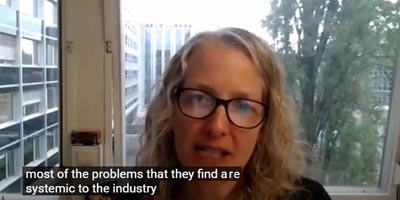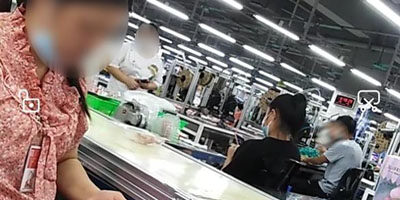Can social audits ensure corporate social responsibility and respect for human rights?
The Karachi factory fire in 2012 caused the deaths of 258 people. Workers struggled to escape the factory but exit doors were locked and windows were covered with iron bars.
The factory had recently been certified as safe by accredited social auditors, so how had this happened? This article looks at supply chain governance and the role of social audits in efforts to improve working conditions and prevent human breaches such as those of the factory blaze.
Can social audits be effective? I spoke with three experts who are working towards better working conditions in company supply chains.
A social audit is a tool to monitor and track a company’s compliance with voluntary standards that provide guidance on ethical integrity. From the environment to labour practices, ethics to health and safety, social audits are meant to monitor the practices of factories within supply chains and test their compliance with a company’s standards. Whether in-house or independent, the reports of social audits can often give an impression of responsible governance, and as such allow governments to abdicate responsibility for assuring human rights protection. Whilst playing an important role in identifying malpractice within production systems, we must see the role of social compliance audits in terms of identifying opportunities that companies must take in order to improve their practices.
Criticism of social audits target weak standards of accountability and transparency, and ineffectiveness in driving change. They can allow a lack of government engagement with its responsibilities towards workers’ rights and the legal implications of human rights breaches.
Jenny Holdcroft, assistant general secretary of the global union IndustriALL, is sceptical about the role of social audits. The horrors of the Rana Plaza disaster in Bangladesh in 2013 still resonate in the garment industry, but social audits affect not only textiles but also other factories, such as pharmaceuticals and electronics.
Holdcroft played a pivotal role in the creation of the 201 Bangladesh Accord to protect workers, and is concerned that systemic problems will not be solved by social audits.
“They give you a sense of where the risks are, but by this point twenty or thirty years into this work, everyone knows what the risks are and they’re the same risks for everybody,” she says. “Just because you’ve happened to find a violation in one factory, it doesn’t mean you’re going to have any real impact on the drivers that lead this violation in the first place, because these factories are operating within a system that is built on violations, that’s built on hostility to trade unions and low wages, and on high working hours.”
But do audits have a role to play? Whilst the standards by which company practices are measured are voluntary, social audits can identify violations. However, this must be followed up by further corrective work in order to ensure the recommendations by auditors are carried out.
“If you go to the doctor, get checked up and take none of the advice the doctor gives you, then of course it’s a waste of time and money,” Rona Starr from the Association of Professional Social Compliance Audits said in an interview for this article. “It’s the same with an audit. They come in and review your practices, share the areas of opportunity and give feedback that maybe they retrieved from the workers. And if you choose to not take that on board, then nothing’s going to change.”
Voluntary standards
Is there a place for social audits within supply chains whilst the standards they must meet are voluntary? Sarah Herbst, the global ethical sourcing manager of Perrigo, the personal health care company, says she believes there is a role for law to evolve, but it’s not a silver bullet. “What we’re working with are complex problems involving the environment and people, and the bottom line of a company,” she told me. “It needs to make business sense, but we need to work together as we’re all after the same goal, which I remind factories in my role at Perrigo.”
“We want to continue to have products on the shelf and sustain our business relationship. At the same time a happy employee is a productive employee, this is a win-win for everybody. And it’s not just legal going to come in and say that we need to do A and B. It can’t just be policing, it can’t just be the stick. We have to have some carrot too.”
To this end, the UN Guiding Principles on Human Rights provides the basic framework of expectations. More binding instruments are slowly coming into force in the UK, France and Germany through legal means, which force companies to report on their supply chains. However, when laws in production countries, such as Bangladesh or Cambodia, are repeatedly and consistently broken, we must ask whether these laws have any clout. Do they provide concrete external motivation for suppliers to treat their workers with integrity rather than just meet the needs of the demands of brands and companies?
A lot of what is included in social audits is compliance with current laws in the countries of production, as Rona Starr highlights. However, most governments don’t have the bandwidth to monitor and check each and every facility. They may thus have overworked and underpaid staff, with responsibility being shifted elsewhere.
The role of law and regulation
So how do we meaningfully effect change in the practices of companies within the framework of expectations set out by the UN? Rona Starr thinks legislation won’t solve the issue unless it is effectively targeted. “Do I think bring in more law and legislation is going to help; probably not. Does it assist brands retailers in the conversations, in that they’re legally required to do X, Y and Z? Absolutely, and I don’t necessarily feel in a personal opinion that it’s going to change if they brought in more legislation. I certainly think from a reporting perspective, we need more requirements to report on what they’re doing to correct the issues that are found, because I think that’s one of the biggest gaps. A lot of people are auditing but they’re not doing anything with the reports when they’re finished.”
The work being done by Rona Starr in centralizing and regulating the profession of auditors will go some of the way to tackling ‘audit fatigue’, where factories get audited multiple times in a year and as such time spent preparing for audits could be used for implementing the recommendations.
Sarah Herbst says there’s a risk that social audits create the illusion of governance within supply chain management, where it is presumed that human rights breaches are resolved if they have been called out, or the box has been ticked. So social audits can allow companies to write glossy sustainability reports at the end of the year, and dodge questions about the integrity of their systems and what actually goes on within their supply chain.
“I constantly challenge why we are doing this; and what are we getting out of it; because factories do have laws that they’re breaking,” she says. “There might be unsafe factories when it comes to emergency exits blocked, for example, not necessarily locked but there’s something in front of it; there are still bad practices happening. So are these audits allowing those retailers to check the box to say they’re being responsibly, or is it an illusion?”
The Corporate Human Rights Benchmark’s 2018 Key Finding reports the average score for human rights practices was 4.9 out of 20. The highest score of any company was a 16.3, and even this was an outlier compared to other companies in the list.
The issues manifest as child labour, underpaid staff, poor working conditions and beyond, but their roots run deeper. Jenny Holdcroft tells us that as, an international union, “What we’re trying to do now is to get the companies that we work with to call for more binding regulation, because it’s in their interests. The sort of regulation we’d be calling for is something they could easily comply with, but it would mean their competitors would be forced to comply too”.
The regulation is needed throughout the supply chain, Holdcroft said. “Companies do not trust their own customers; the lack of trust between brands and their suppliers is extraordinary.”
The ways forward
People like Sarah Herbst and Rona Starr are working with businesses and auditing firms to improve the effectiveness of social compliance audits, and improve transparency and issues around audit fatigue. For them, social audits are a cog in the machine that prevents major incidents that we’ve seen in within the supply chains of some of the most well-known brands in recent years.
However, for Jenny Holdcroft, social audits alone don’t fix the systemic issues within production and supply chains. We must support changes in the purchasing practices of the brands so that the way that they do business with the factories changes, she says. “They have to pay more, and they have to change the way that they do their ordering.”




